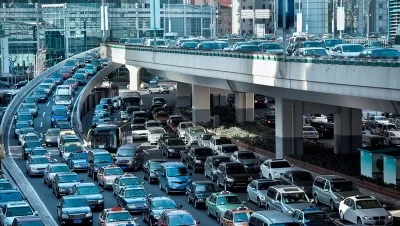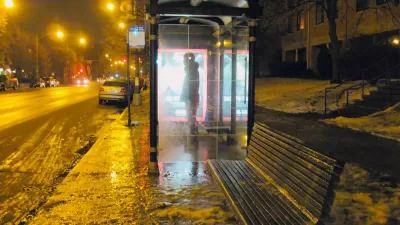The price of long commutes can't just be measured in lost hours. Income segregation, job sprawl, and the resulting negative feedback on families eats into overall economic and social well-being.

"Working multiple jobs is one way to have less time with your kids; a long commute is another." In this article, Whet Moser explores the economic losses that go hand-in-hand with that social truth. Income segregation and job sprawl are the main challenges.
The Metropolitan Planning Council's Marisa Novara remarked, "When low-wage workers have to pay a huge amount of their paycheck just to get to work, or when they're located in places that public transit doesn't go, it's not just a detriment to an individual low-wage worker, it actually negatively impacts the whole economy. Higher skill work needs the lower skill work in order to thrive."
Moser pulls from work by the economist Raj Chetty, who concludes that poor access to jobs directly hinders social mobility. "By Chetty's numbers, commute time is up there with the fraction of single parents in terms of correlation [...] But among the factors he did study—family structure, race and income segregation, school quality, social capital—[commute time] doesn't get a lot of attention for its effects on social outcomes."
FULL STORY: Bad Commutes Make an Economy Worse

Maui's Vacation Rental Debate Turns Ugly
Verbal attacks, misinformation campaigns and fistfights plague a high-stakes debate to convert thousands of vacation rentals into long-term housing.

Planetizen Federal Action Tracker
A weekly monitor of how Trump’s orders and actions are impacting planners and planning in America.

In Urban Planning, AI Prompting Could be the New Design Thinking
Creativity has long been key to great urban design. What if we see AI as our new creative partner?

King County Supportive Housing Program Offers Hope for Unhoused Residents
The county is taking a ‘Housing First’ approach that prioritizes getting people into housing, then offering wraparound supportive services.

Researchers Use AI to Get Clearer Picture of US Housing
Analysts are using artificial intelligence to supercharge their research by allowing them to comb through data faster. Though these AI tools can be error prone, they save time and housing researchers are optimistic about the future.

Making Shared Micromobility More Inclusive
Cities and shared mobility system operators can do more to include people with disabilities in planning and operations, per a new report.
Urban Design for Planners 1: Software Tools
This six-course series explores essential urban design concepts using open source software and equips planners with the tools they need to participate fully in the urban design process.
Planning for Universal Design
Learn the tools for implementing Universal Design in planning regulations.
planning NEXT
Appalachian Highlands Housing Partners
Mpact (founded as Rail~Volution)
City of Camden Redevelopment Agency
City of Astoria
City of Portland
City of Laramie





























